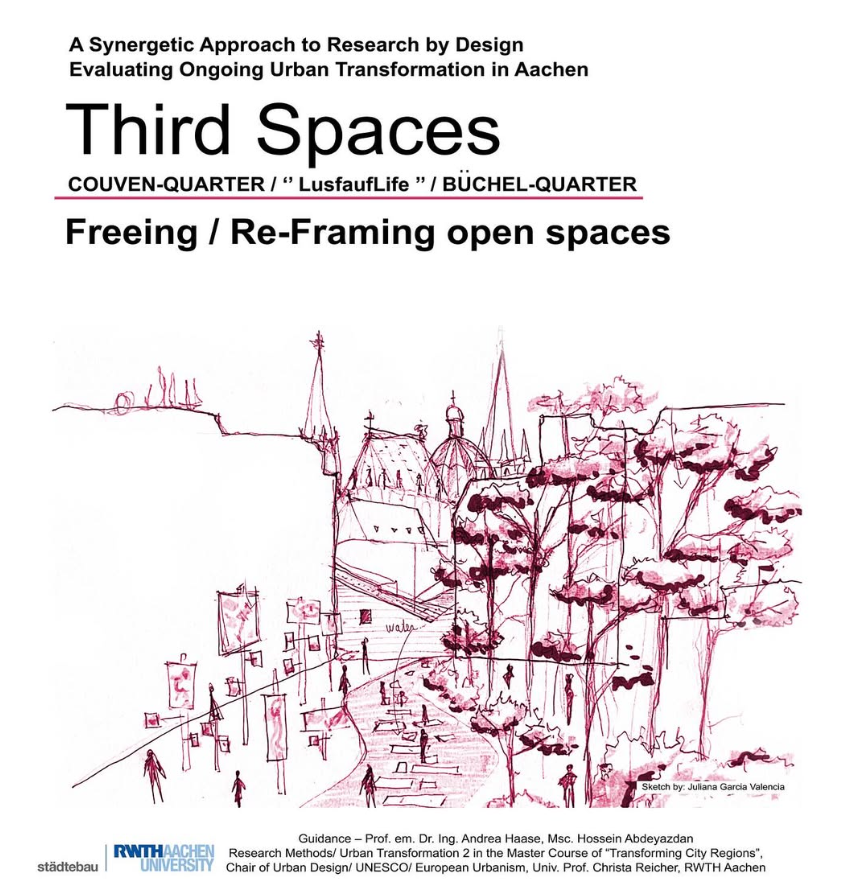Freeing/ Re-Framing open spaces
A Synergetic Approach to Evaluating Urban Transformation in Aachen
Urban Transformation in History and in Perspective. Teaching and Learning Aims of the two combined courses “Research Methods” (elective) and “Urban Transformation II” (compulsory) in the Master Course of “Transforming City Regions”, Summer Semester 2024
Guidance:
Prof. em Dr. Ing. Andrea Haase/ Msc. Hossein Abdeyazdan
Inputs:
Msc. Hossein Abdeyazdan, Daniel Christian Wahl (Video), Prof. Hermann Schnell, Dipl. Ing. Georg Helmes/ Dipl. Ing. Markus Ulrich/ Dipl. Ing. Antje Eickhoff/ 3 Tuesday evening Conferences “Innenstadt der Quartiere” in Foyer of REIFF Museum, Faculty of Architecture, RWTH Aachen – guided by Univ. Prof. Christa Reicher ( 23.04. 2024; 14. 05. 2024; 18.06. 2024)/ 2 Public Meetings about “Haus der Neugier”, in: “Aachen Fenster” at Mayersche, guided by Dipl. Ing. Björn Schötten (6.12. 2023; 10.04. 2024)
Student-Participants:
Ana Paulina Cabello Ocampo; Jana Westerkamp; Lindy Huang; Laura Barbosa; Cemre Cabuk; Juliana Garcia Valencia; Elif Ertemiz; Shubhrata Naik; Elies Horemans; Irem Bozdagla; Yuhan Liu; Hsin-Hsuan Chen; Yining Sun, Qian Chen; Tooba Tahir; Kazi Ruhi Rizoana; Aquib Arfi; Wanyun Ling; Yunyi Huang; Huijuan Wu; Muhammad Bin Monsur
Editorial Board:
Prof. em Dr. Ing. Andrea Haase/ Msc. Hossein Abdeyazdan
Lecturer: Prof. em Dr. Ing. Andrea Haase
Summer Semester 2024
THEME:THIRD SPACES –To enrich urban functions by places of staying, of communicating, of sharing pleasure. To contribute to LOCAL CULTURE as the fourth leg of sustainability by providing public spaces with niches for privacy in built and open inner urban spaces, giving respect to location and urban structure – by a framed variety of structural elements, providing spaces for perceiving the meaning of use, image and spatial organization.
RESEARCH INTEREST – Teaching and learning were preparing for concept-finding by evaluating ongoing processes of urban transformation in two inner urban locations of the City of Aachen. Concept-finding was about contemporary tasks of responding to stages of “emptiness” in urban transformation, preparing for “THIRD SPACES”. Both the combined courses, the compulsory course “Urban Transformation II” and the elective course “Research Methods”, have found contemporary roots in a theme-related methodology, respecting the urban morphology/ local cultural heritage – tangible/ intangible kind of. On this basis, understanding the urban structure and its potential for transformation has been led to scenarios with paradigms for local area transformation. Major importance was given to the starting point of investigation (“what do I know for certain?”), clarifying the basis for outlining the evaluation (“What do I want to find out on this basis?”). The students were challenged to validate existing strategies critically-creatively and were invited to interprete official planning proposals by their visions – to be discussed as alternatives. They were taught to carry out the argument with themselves individually and collectively and to precise and control their positions academically through searching for socio-cultural and spatio-economic concepts in contrast to obsolete patterns of modernizing urban development. They were asked to localize multi-scale impulses through system-thinking, applying modernization- and innovation theory.
